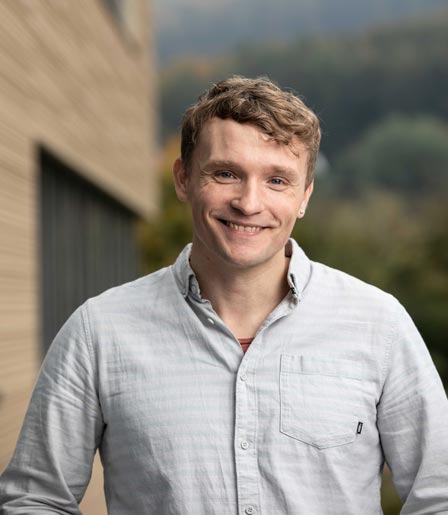November 11, 2020
Mikhail Lemeshko appointed member of the Young Academy of the Austrian Academy of Sciences
The outstanding young scientist and IST Austria physics professor is looking forward to exchanging ideas with researchers from different disciplines.

© IST Austria / Nadine Poncioni
How will a new material behave? What properties will it have, and how can this be described or even predicted? This is what Professor Mikhail Lemeshko wants to find out with the help of theoretical models. “I am interested in quite normal things like atoms, molecules, and crystals – my field is theoretical physics around us,” says the IST Austria professor. For his outstanding research achievements, the 35-year-old physicist has now been elected a member of the Young Academy of the Austrian Academy of Sciences.
The Young Academy consists of up to 70 already established young scientists from various disciplines who have excelled in their fields. Its goal is to promote scientific exchange and thus to enable innovative research. “I grew up as a scientist in a physics bubble. At IST, I have the great opportunity to talk to biologists, mathematicians, and chemists, but I never had much contact with the humanities. I’m looking forward to being able to exchange ideas with humanities researchers from now on because I have no idea how they think and approach scientific problems,” says Mikhail Lemeshko.
After three years as an independent postdoc at Harvard University, Mikhail Lemeshko has now worked at IST Austria for six years. It was here that the Russian-born scientist discovered the quasi-particle called “Angulon”. A quasi-particle is a physical concept that can be used to describe complex systems in a simplified way. To describe systems consisting of countless individual particles mathematically, physicists would have to model trillions of particles’ interactions. This is time-consuming, if not impossible. With the help of Angulon, calculations can be made that were previously impossible. For example, it can help solve problems in storing large amounts of data, physical chemistry, and other fields. In 2017, Mikhail Lemeshko received the Ludwig Boltzmann Prize of the Austrian Physical Society. His research group consisting of ten postdoc and doctoral students focuses on the physics of quantum impurities that have an orbital angular momentum. In addition to his scientific work, Misha Lemeshko very entertainingly explains physical topics for nonprofessionals on his YouTube channel.



